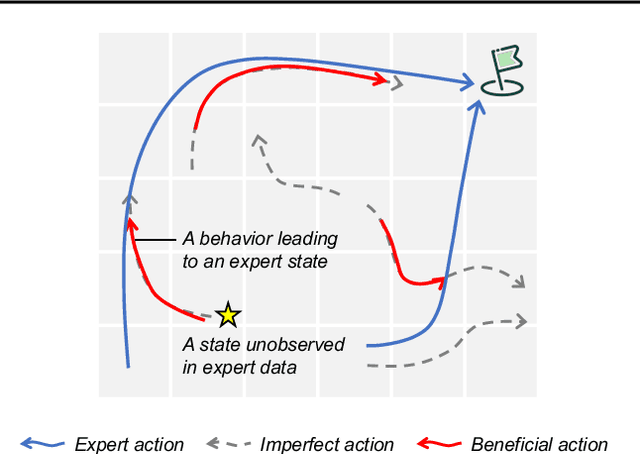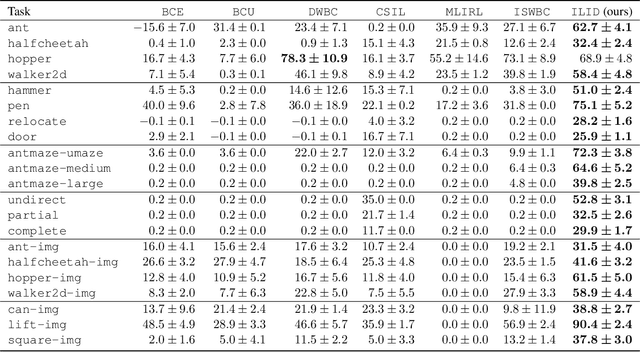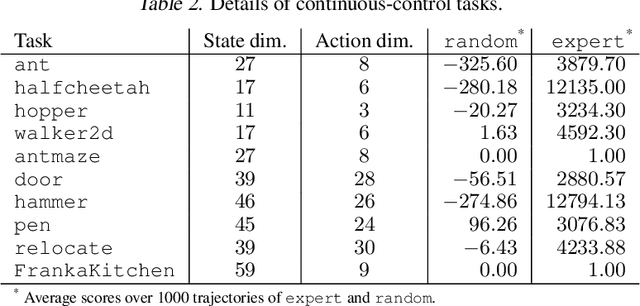Junshan Zhang
Sherman
Adversarial Reward Auditing for Active Detection and Mitigation of Reward Hacking
Feb 02, 2026Abstract:Reinforcement Learning from Human Feedback (RLHF) remains vulnerable to reward hacking, where models exploit spurious correlations in learned reward models to achieve high scores while violating human intent. Existing mitigations rely on static defenses that cannot adapt to novel exploitation strategies. We propose Adversarial Reward Auditing (ARA), a framework that reconceptualizes reward hacking as a dynamic, competitive game. ARA operates in two stages: first, a Hacker policy discovers reward model vulnerabilities while an Auditor learns to detect exploitation from latent representations; second, Auditor-Guided RLHF (AG-RLHF) gates reward signals to penalize detected hacking, transforming reward hacking from an unobservable failure into a measurable, controllable signal. Experiments across three hacking scenarios demonstrate that ARA achieves the best alignment-utility tradeoff among all baselines: reducing sycophancy to near-SFT levels while improving helpfulness, decreasing verbosity while achieving the highest ROUGE-L, and suppressing code gaming while improving Pass@1. Beyond single-domain evaluation, we show that reward hacking, detection, and mitigation all generalize across domains -- a Hacker trained on code gaming exhibits increased sycophancy despite no reward for this behavior, and an Auditor trained on one domain effectively suppresses exploitation in others, enabling efficient multi-domain defense with a single model.
VITA: Vision-to-Action Flow Matching Policy
Jul 17, 2025Abstract:We present VITA, a Vision-To-Action flow matching policy that evolves latent visual representations into latent actions for visuomotor control. Traditional flow matching and diffusion policies sample from standard source distributions (e.g., Gaussian noise) and require additional conditioning mechanisms like cross-attention to condition action generation on visual information, creating time and space overheads. VITA proposes a novel paradigm that treats latent images as the flow source, learning an inherent mapping from vision to action while eliminating separate conditioning modules and preserving generative modeling capabilities. Learning flows between fundamentally different modalities like vision and action is challenging due to sparse action data lacking semantic structures and dimensional mismatches between high-dimensional visual representations and raw actions. We address this by creating a structured action latent space via an autoencoder as the flow matching target, up-sampling raw actions to match visual representation shapes. Crucially, we supervise flow matching with both encoder targets and final action outputs through flow latent decoding, which backpropagates action reconstruction loss through sequential flow matching ODE solving steps for effective end-to-end learning. Implemented as simple MLP layers, VITA is evaluated on challenging bi-manual manipulation tasks on the ALOHA platform, including 5 simulation and 2 real-world tasks. Despite its simplicity, MLP-only VITA outperforms or matches state-of-the-art generative policies while reducing inference latency by 50-130% compared to conventional flow matching policies requiring different conditioning mechanisms or complex architectures. To our knowledge, VITA is the first MLP-only flow matching policy capable of solving complex bi-manual manipulation tasks like those in ALOHA benchmarks.
Ego-centric Learning of Communicative World Models for Autonomous Driving
Jun 09, 2025Abstract:We study multi-agent reinforcement learning (MARL) for tasks in complex high-dimensional environments, such as autonomous driving. MARL is known to suffer from the \textit{partial observability} and \textit{non-stationarity} issues. To tackle these challenges, information sharing is often employed, which however faces major hurdles in practice, including overwhelming communication overhead and scalability concerns. By making use of generative AI embodied in world model together with its latent representation, we develop {\it CALL}, \underline{C}ommunic\underline{a}tive Wor\underline{l}d Mode\underline{l}, for MARL, where 1) each agent first learns its world model that encodes its state and intention into low-dimensional latent representation with smaller memory footprint, which can be shared with other agents of interest via lightweight communication; and 2) each agent carries out ego-centric learning while exploiting lightweight information sharing to enrich her world model, and then exploits its generalization capacity to improve prediction for better planning. We characterize the gain on the prediction accuracy from the information sharing and its impact on performance gap. Extensive experiments are carried out on the challenging local trajectory planning tasks in the CARLA platform to demonstrate the performance gains of using \textit{CALL}.
IN-RIL: Interleaved Reinforcement and Imitation Learning for Policy Fine-Tuning
May 15, 2025Abstract:Imitation learning (IL) and reinforcement learning (RL) each offer distinct advantages for robotics policy learning: IL provides stable learning from demonstrations, and RL promotes generalization through exploration. While existing robot learning approaches using IL-based pre-training followed by RL-based fine-tuning are promising, this two-step learning paradigm often suffers from instability and poor sample efficiency during the RL fine-tuning phase. In this work, we introduce IN-RIL, INterleaved Reinforcement learning and Imitation Learning, for policy fine-tuning, which periodically injects IL updates after multiple RL updates and hence can benefit from the stability of IL and the guidance of expert data for more efficient exploration throughout the entire fine-tuning process. Since IL and RL involve different optimization objectives, we develop gradient separation mechanisms to prevent destructive interference during \ABBR fine-tuning, by separating possibly conflicting gradient updates in orthogonal subspaces. Furthermore, we conduct rigorous analysis, and our findings shed light on why interleaving IL with RL stabilizes learning and improves sample-efficiency. Extensive experiments on 14 robot manipulation and locomotion tasks across 3 benchmarks, including FurnitureBench, OpenAI Gym, and Robomimic, demonstrate that \ABBR can significantly improve sample efficiency and mitigate performance collapse during online finetuning in both long- and short-horizon tasks with either sparse or dense rewards. IN-RIL, as a general plug-in compatible with various state-of-the-art RL algorithms, can significantly improve RL fine-tuning, e.g., from 12\% to 88\% with 6.3x improvement in the success rate on Robomimic Transport. Project page: https://github.com/ucd-dare/IN-RIL.
AugFL: Augmenting Federated Learning with Pretrained Models
Mar 04, 2025Abstract:Federated Learning (FL) has garnered widespread interest in recent years. However, owing to strict privacy policies or limited storage capacities of training participants such as IoT devices, its effective deployment is often impeded by the scarcity of training data in practical decentralized learning environments. In this paper, we study enhancing FL with the aid of (large) pre-trained models (PMs), that encapsulate wealthy general/domain-agnostic knowledge, to alleviate the data requirement in conducting FL from scratch. Specifically, we consider a networked FL system formed by a central server and distributed clients. First, we formulate the PM-aided personalized FL as a regularization-based federated meta-learning problem, where clients join forces to learn a meta-model with knowledge transferred from a private PM stored at the server. Then, we develop an inexact-ADMM-based algorithm, AugFL, to optimize the problem with no need to expose the PM or incur additional computational costs to local clients. Further, we establish theoretical guarantees for AugFL in terms of communication complexity, adaptation performance, and the benefit of knowledge transfer in general non-convex cases. Extensive experiments corroborate the efficacy and superiority of AugFL over existing baselines.
Heterogeneous Decision Making in Mixed Traffic: Uncertainty-aware Planning and Bounded Rationality
Feb 25, 2025Abstract:The past few years have witnessed a rapid growth of the deployment of automated vehicles (AVs). Clearly, AVs and human-driven vehicles (HVs) will co-exist for many years, and AVs will have to operate around HVs, pedestrians, cyclists, and more, calling for fundamental breakthroughs in AI designed for mixed traffic to achieve mixed autonomy. Thus motivated, we study heterogeneous decision making by AVs and HVs in a mixed traffic environment, aiming to capture the interactions between human and machine decision-making and develop an AI foundation that enables vehicles to operate safely and efficiently. There are a number of challenges to achieve mixed autonomy, including 1) humans drivers make driving decisions with bounded rationality, and it remains open to develop accurate models for HVs' decision making; and 2) uncertainty-aware planning plays a critical role for AVs to take safety maneuvers in response to the human behavior. In this paper, we introduce a formulation of AV-HV interaction, where the HV makes decisions with bounded rationality and the AV employs uncertainty-aware planning based on the prediction on HV's future actions. We conduct a comprehensive analysis on AV and HV's learning regret to answer the questions: 1) {How does the learning performance depend on HV's bounded rationality and AV's planning}; 2) {How do different decision making strategies impact the overall learning performance}? Our findings reveal some intriguing phenomena, such as Goodhart's Law in AV's learning performance and compounding effects in HV's decision making process. By examining the dynamics of the regrets, we gain insights into the interplay between human and machine decision making.
Towards Unraveling and Improving Generalization in World Models
Dec 31, 2024Abstract:World models have recently emerged as a promising approach to reinforcement learning (RL), achieving state-of-the-art performance across a wide range of visual control tasks. This work aims to obtain a deep understanding of the robustness and generalization capabilities of world models. Thus motivated, we develop a stochastic differential equation formulation by treating the world model learning as a stochastic dynamical system, and characterize the impact of latent representation errors on robustness and generalization, for both cases with zero-drift representation errors and with non-zero-drift representation errors. Our somewhat surprising findings, based on both theoretic and experimental studies, reveal that for the case with zero drift, modest latent representation errors can in fact function as implicit regularization and hence result in improved robustness. We further propose a Jacobian regularization scheme to mitigate the compounding error propagation effects of non-zero drift, thereby enhancing training stability and robustness. Our experimental studies corroborate that this regularization approach not only stabilizes training but also accelerates convergence and improves accuracy of long-horizon prediction.
EI-Drive: A Platform for Cooperative Perception with Realistic Communication Models
Dec 13, 2024



Abstract:The growing interest in autonomous driving calls for realistic simulation platforms capable of accurately simulating cooperative perception process in realistic traffic scenarios. Existing studies for cooperative perception often have not accounted for transmission latency and errors in real-world environments. To address this gap, we introduce EI-Drive, an edge-AI based autonomous driving simulation platform that integrates advanced cooperative perception with more realistic communication models. Built on the CARLA framework, EI-Drive features new modules for cooperative perception while taking into account transmission latency and errors, providing a more realistic platform for evaluating cooperative perception algorithms. In particular, the platform enables vehicles to fuse data from multiple sources, improving situational awareness and safety in complex environments. With its modular design, EI-Drive allows for detailed exploration of sensing, perception, planning, and control in various cooperative driving scenarios. Experiments using EI-Drive demonstrate significant improvements in vehicle safety and performance, particularly in scenarios with complex traffic flow and network conditions. All code and documents are accessible on our GitHub page: \url{https://ucd-dare.github.io/eidrive.github.io/}.
OLLIE: Imitation Learning from Offline Pretraining to Online Finetuning
May 29, 2024



Abstract:In this paper, we study offline-to-online Imitation Learning (IL) that pretrains an imitation policy from static demonstration data, followed by fast finetuning with minimal environmental interaction. We find the na\"ive combination of existing offline IL and online IL methods tends to behave poorly in this context, because the initial discriminator (often used in online IL) operates randomly and discordantly against the policy initialization, leading to misguided policy optimization and $\textit{unlearning}$ of pretraining knowledge. To overcome this challenge, we propose a principled offline-to-online IL method, named $\texttt{OLLIE}$, that simultaneously learns a near-expert policy initialization along with an $\textit{aligned discriminator initialization}$, which can be seamlessly integrated into online IL, achieving smooth and fast finetuning. Empirically, $\texttt{OLLIE}$ consistently and significantly outperforms the baseline methods in $\textbf{20}$ challenging tasks, from continuous control to vision-based domains, in terms of performance, demonstration efficiency, and convergence speed. This work may serve as a foundation for further exploration of pretraining and finetuning in the context of IL.
How to Leverage Diverse Demonstrations in Offline Imitation Learning
May 29, 2024



Abstract:Offline Imitation Learning (IL) with imperfect demonstrations has garnered increasing attention owing to the scarcity of expert data in many real-world domains. A fundamental problem in this scenario is how to extract positive behaviors from noisy data. In general, current approaches to the problem select data building on state-action similarity to given expert demonstrations, neglecting precious information in (potentially abundant) $\textit{diverse}$ state-actions that deviate from expert ones. In this paper, we introduce a simple yet effective data selection method that identifies positive behaviors based on their resultant states -- a more informative criterion enabling explicit utilization of dynamics information and effective extraction of both expert and beneficial diverse behaviors. Further, we devise a lightweight behavior cloning algorithm capable of leveraging the expert and selected data correctly. In the experiments, we evaluate our method on a suite of complex and high-dimensional offline IL benchmarks, including continuous-control and vision-based tasks. The results demonstrate that our method achieves state-of-the-art performance, outperforming existing methods on $\textbf{20/21}$ benchmarks, typically by $\textbf{2-5x}$, while maintaining a comparable runtime to Behavior Cloning ($\texttt{BC}$).
 Add to Chrome
Add to Chrome Add to Firefox
Add to Firefox Add to Edge
Add to Edge